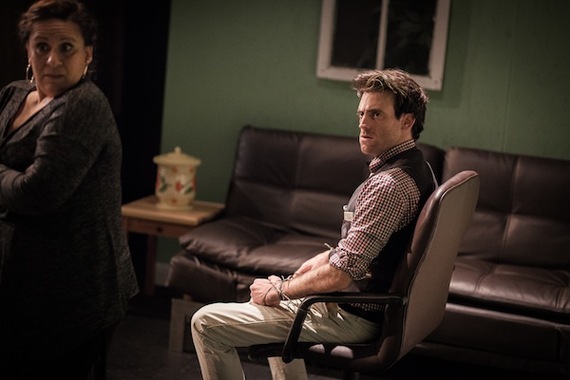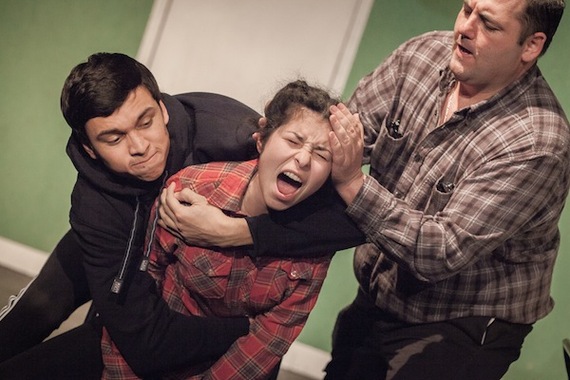Sean E. Zilke's new play is at once an indictment of the animalistic horrors committed by the human race and, adversely, the unbreakable bonds of a loving family. M's Pamphlet, while often uneven and rough around the edges, is a thought-provoking story of a family given a sinister opportunity that leaves a haunting impression on one's psyche. Through this production we are given a rare peek into the endless potential of an important creative voice.
Generally, it is a bit of a mess. However, that's not to say it's an awful mess. To put it in context, if this play were a movie from the '70s or '80s, there's no doubt it would be a cult classic. It's something you might expect out of John Water's cannon, but with the depth of Woody Allen or Charlie Kaufman at their most curious. Throughout, Zilke has strung many shiny pearls of wisdom coupled by witty observations and infused with earthshaking instances of desperation. The performances range from bordering on brilliant to approaching unwatchable caricature. It would be of utmost interest to see future, more fully realized productions of this freshman attempt. The scenes in which the planets align for this dark comedy are undeniably affective. It is a sensitive subject told through the lens of a comedy sketch, an unspeakable crime spoken through farce, a despicable evil turned macabre game show.

Elizabeth Alvarez and Spencer Weitzel in M'S PAMPHLET. Photo by Mark Riley.
It has been said that a good piece of art is one that leaves its audience with more questions than answers. By that measure, this play is of great value to world of creative endeavors. The central confrontational question we're left with is "What would you do?" If your 10-year-old brother or baby boy was brutally murdered and you were given 24 hours with the restrained psychopath who committed the horrific act... Struck with grief, surrounded by hopelessness, braving the deep waters of agony... What would you do? Would you sink to the level of the scarred sociopath that took something so precious from your world? Or would you rise above it? Would you gather some amount of unattainable compassion? Could you maintain some impossible sliver of kindness? The complex situation of a family being given the power to torture a felon is a whole breed of torture in itself.
It calls to mind one of the most controversial movies of recent memory. American Sniper is a film that puts your eye behind the scope of the deadliest gun in American history. What would you do? Would you kill a child in the name of freedom? Is the man who does so a hero? We have this disease of seeing the world as heroes and villains. And we really don't like to the mix the two. But as Carl Jung would tell you, there's a duality to humanity. Nobody wants to go to war. But there is war out there. It exists. So when you're faced with a choice: them or you? Are you one to survive or let it destroy you? When you start to circumstantially bend your morals, you'd be surprised what you are capable of. We like to believe that we are all good, and anybody who inhibits our ability to see ourselves as such, is an evil person. But that's almost never the case. This daring feature flips the script and gives the heroes the morbid opportunity to play the villain.

Charlie Sanchez, Marilyn Fitoria & Paul Tully in M'S PAMPHLET.
Photo by Mark Riley.
So what can we glean from all this philosophical, hero-villain mumbo jumbo? It's really simple in explanation, but complicated in implication. There are no heroes. There are no villains. There are only people. And people can be warm and wonderful or, given the opportunity, they can be murderous monsters. The justice system is designed to cast blame and assign punishment. But in many cases it is the society we've built that challenges human nature to its inevitable breaking point. It is much easier, and much more comforting, to say that someone is evil or the modern equivalents of the term: terrorist, criminal, murderer, sex offender, gangster. But what is the difference between a man who murders under pressure in a robbery and man who kills under pressure while wearing a blue suit and a badge? Are these not purely constructions we've built to see a muddy world more clearly? Who are the criminals? Who are the just? And who is to judge?
The best you can hope for in this vacant world is somebody to hold. It is those we are closest to. Our families, our friends, those with which we share love. Those smiles and heartbreaks, those kind eyes at the end of the day, those relationships we fight to maintain. That is all there is in the world. You show me a person who doesn't need love and you will see a sick, lost, lonely soul. So hold those people tight every chance you get.
The most impressive achievement of Sean E. Zilke and his cast is how fucking fearless it all is. People could argue that comedic irreverence is not impressive. Or that comedy has a time and place, and it's actually disrespectful to apply such silly tones to tragedy. Those mental midgets have no place in art. There is an indefinable beauty to this work. It's got guts. And that is something too seldom seen onstage. That, more than anything else, is what can save theatre from fading into complete irrelevance. That, more than anything, deserves to be seen. That, more than anything, is art.